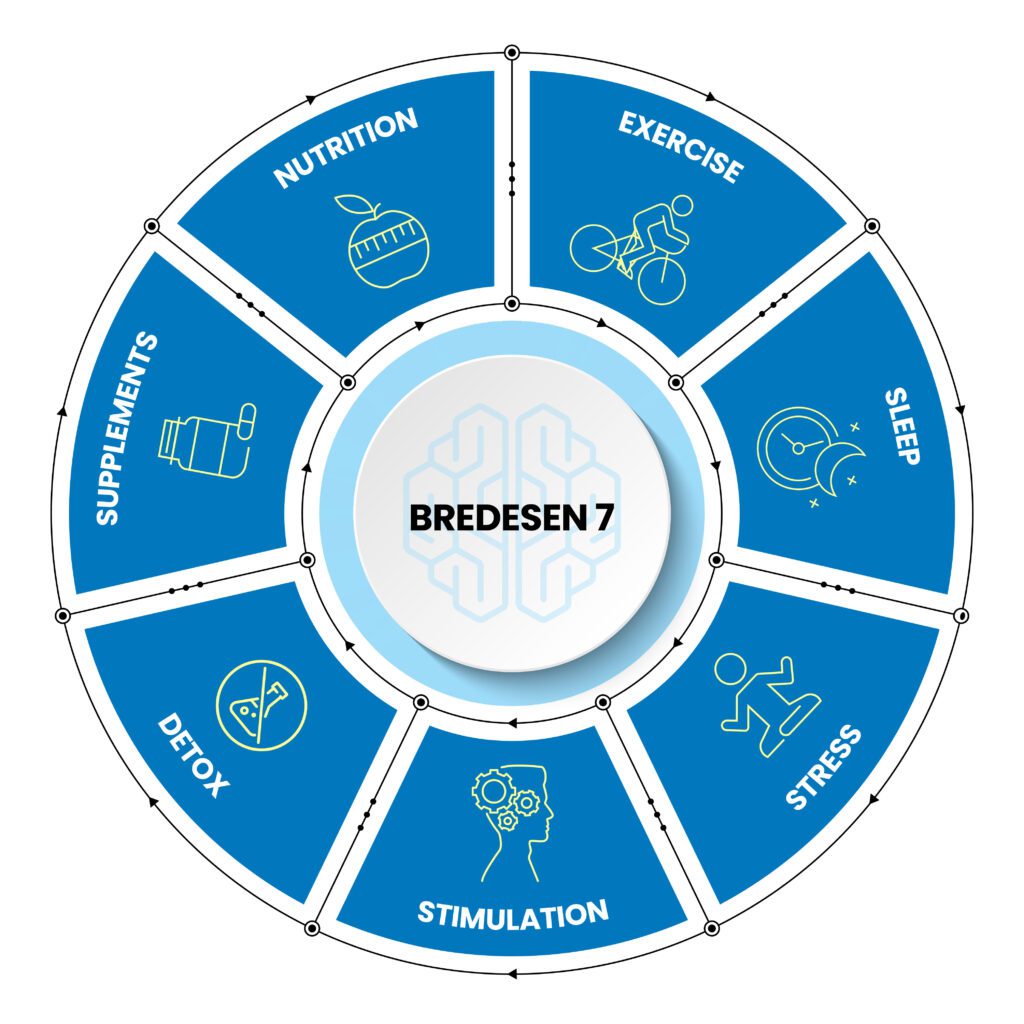After three decades of research, working with hundreds of patients, leading neurologist, Dr. Dale Bredesen, developed the “Bredesen Seven”—seven key lifestyle habits that protect and restore brain health. Nutrition, exercise, supplements, stress management, brain stimulation, detoxification, and quality sleep all have a big impact on brain health. Follow these simplified steps recommended by Dr. Bredesen to optimize cognition and memory.

Nutrition

Making mindful decisions about the foods you eat, and when you eat them, builds the foundation for brain health. Dr. Bredesen has found that the most effective nutrition for supporting brain health includes a mildly ketogenic, plant-rich diet combined with nightly fasting of a minimum of 12 hours (with at least three before bed)—called KetoFLEX 12/3.
A quick tip from Dr. Bredesen: Keto-friendly foods, like free-range chickens and pasteurized eggs as well as liver and grass-fed beef, are a great source of choline—a key nutrient for brain health and memory. Learn more about the Bredesen diet, KetoFLEX 12/3.
Exercise

Exercise plays a big role in protecting brain health. It increases cerebral blood flow and brain-derived-neurotrophic factor (BDNF), a critical molecule for healthy brain cells to grow and thrive. Staying active also promotes quality sleep, reduces overall stress, and improves insulin sensitivity—important factors in protecting brain health.
A quick tip from Dr. Bredesen: Exercise doesn’t have to mean training for a marathon. The important thing is to increase your heart rate and get the blood pumping to your brain. Aim for at least 30 minutes, five days per week, whether it’s a brisk walk at the park or a workout at the gym. Find something you enjoy doing, that you’ll stick to.
Sleep

The brain needs quality sleep to restore, repair, and function at its best. Adopt a sleep schedule that allows you to get seven to eight hours of restorative rest each night—without noise, lights, or Wi-Fi. If you experience sleep disorders, such as sleep apnea or insomnia, consult with a medical professional about possible treatments.
A quick tip from Dr. Bredesen: Taking melatonin supplements 30 minutes before bed can help regulate your sleep-wake cycle, so you fall asleep easily and improve the quality of rest.
Stress

We all have to deal with stress at some point. But, unless you learn techniques to manage it, stress can wreak havoc on your health, including your brain. So how do you deal with stress? Adopt stress management practices, avoid over-scheduling, and rest when you need to.
A quick tip from Dr. Bredesen: Practices such as meditation or deep breathing can help manage stress. Spending time outside to get fresh air and a little sunshine can also help clear your thoughts and reduce the negative effects of stress on your brain and body.
Brain Stimulation

Keeping our brains stimulated and active helps maintain brain function and memory. Certain lifestyle habits, activities, and even some unexpected therapies promote new neural pathways and keep our minds sharp. You can also keep your brain stimulated by staying socially active and maintaining a sense of purpose through work, volunteering, or community involvement.
A quick tip from Dr. Bredesen: Practice hobbies, like puzzles, playing an instrument, brain training apps, and reading. They promote new neural pathways and long-term brain health.
Detox

Exposure to toxins from the environment, food, and personal care products can take a toll on our brain health. Avoid exposure to mold, which can negatively impact cognition. Practice good oral hygiene, as tooth infections can also affect brain health.
A quick tip from Dr. Bredesen: To avoid exposure to toxins, switch to cosmetic products and cleaning supplies made from natural ingredients. Prioritize getting outdoors as much as possible to enjoy the detoxifying benefits of fresh air and nature. “Shinrin yoku” (forest bathing in Japanese) has health-boosting benefits as you immerse yourself and bring awareness to your natural surroundings.
Supplementation

The foods we eat don’t always meet the nutritional needs for a healthy brain. That’s where supplementation comes into play. Taking daily supplements provides those key ingredients to support memory and thinking, especially if you suffer from a specific nutritional deficiency that affects your cognitive health.
A quick tip from Dr. Bredesen: Take NeuroQ Memory & Focus daily. Formulated in partnership with Dr. Bredesen, Memory & Focus contains key ingredients to protect memory and keep your mind sharp. The formula has been clinically shown to improve memory, focus, and mental clarity.
Begin Your Brain Health Journey
The brain is complex, but taking care of it doesn’t have to be. Even small changes can make a big difference when it comes to protecting your memory and cognition. By setting goals and then achieving those goals, you’re inching closer to achieving your full potential and supporting your brain health in the process.
Curious about your brain health and how to improve it? A cognoscopy assesses your cognition and screens for early signs of Alzheimer’s disease. It’s a step that can greatly lower your risk of cognitive decline. Read more about how a cognoscopy helps keep track of your brain health.





